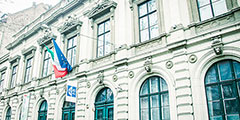Well known & unknown people. An institution of decision making from the distant past, diplomats and posh political gatherings for the cause of world peace.
People from the more recent past: the persecuted and those trying to save them.
House of Representatives – Old Parliament (1866-1902) (now housing the Italian Institute)
The Interparliamentary Union held its assembly here in September 1896. European parliaments, including that of Hungary, delegated 433 representatives. The assembly was opened on 22 September by Kálmán Széll. The Assembly immediately followed the 7th International Peace Congress, which was held at the New City Hall of Budapest. The former assembly was made up of the representatives of national governments, while the latter was a forum for those committed to peace, including the representatives of peace organisations, where they could share their thoughts and initiated cooperation projects.
“Is it possible to love our homeland without hating our neighbours?”
– Ferenc Kemény
Giorgio Perlasca (1910 – 1992)
In the 1920s he was a supporter of Fascism and fought in the Spanish civil war on Franco’s side as a volunteer. However, later events led to his estrangement from Fascist ideology. From October 1942 he worked in Budapest. Following the German occupation he actively participated in the work of those members of the diplomatic corpse who saved people from persecution, working with Raoul Wallenberg, Carl Lutz and Ángel Sanz-Briz. He helped Hungarian Jews obtain Spanish citizenship and documents of protection and also set up protected houses and watched over their inhabitants. Later, posing as a diplomat, he wrote and signed protection documents and got people out of the Jewish houses set up by the Arrow Cross Party. In 1988 in Padova he received the Medal of the Righteous from the State of Israel and in 1989 he was awarded the XXX of the Republic of Hungary from the Hungarian state.
Question: What do you think about the relationship between politics and peace activism?
Recreation spots: the café of the Italian Institute, the cafés along Múzeum Boulevard, National Museum, the Faculty of Humanities of the Eötvös Loránd University of Sciences.






 4 minutes
4 minutes